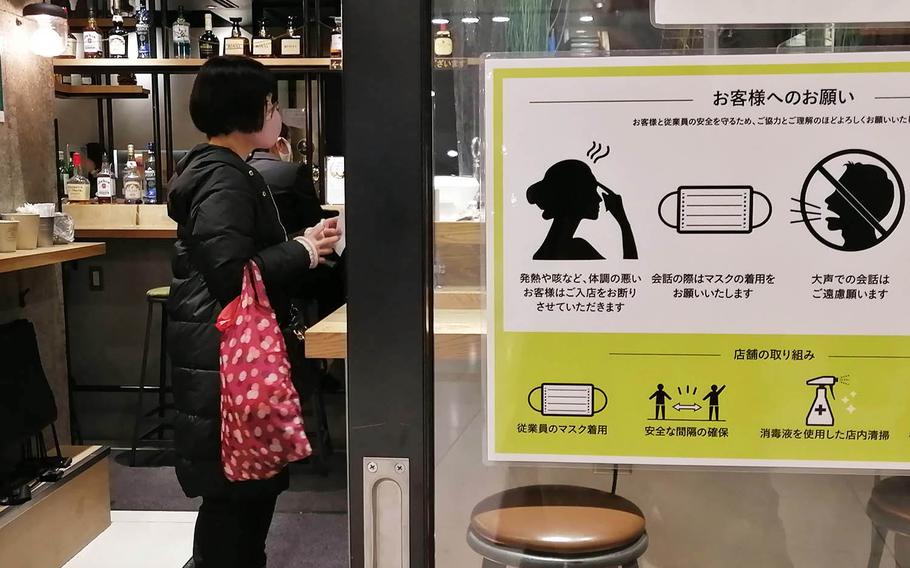
Signs in a shopping area near Yokohama Station urge passersby to observe coronavirus prevention measures on Dec. 21, 2020. (Akifumi Ishikawa/Stars and Stripes)
Stars and Stripes is making stories on the coronavirus pandemic available free of charge. See other free reports here. Sign up for our daily coronavirus newsletter here. Please support our journalism with a subscription.
TOKYO — Japan is considering a second state of emergency in the greater Tokyo metro area, four separate prefectures, due to escalating numbers of coronavirus cases there, Prime Minister Yoshihide Suga said Monday at a news conference.
Japan is exceeding 3,000 new cases nationwide per day, Suga said, and the number of patients in serious condition is high. The nation reached a new daily record, 4,540 new cases, on Thursday, according to the Johns Hopkins Coronavirus Resource Center.
New patients in Tokyo, Kanagawa, Chiba and Saitama make up about half of the total cases in Japan and the number of people visiting busy downtown precincts in these areas did not decline in December as it did elsewhere, Suga said. Tokyo reached a record daily high of 1,337 on Thursday, according to Tokyo Metropolitan Government data.
“There is a need to send a strong message as the situation is serious and number of cases have been high in Tokyo and the three prefectures,” Suga said.
He did not say when a state of emergency will be declared or how long it will last. Japanese media reported Monday that the Japanese government is preparing to make the declaration this week.
If Suga acts, it will be the second state of emergency for those areas of Japan since the pandemic began. His predecessor Shinzo Abe declared a monthlong emergency for the same four prefectures and two others in April.
An emergency declaration would permit prefectural governors to ask or instruct people to stay home and to close schools and businesses.
The situation is “extremely serious,” Suga said. The number of new infections did not fall during the first three days of the New Year holiday, when the metro government asked its citizens to stay home and celebrate the holiday quietly.
U.S. Forces Japan, the liaison between the U.S. military and the Japanese government, is monitoring the situation but has no immediate plans to alter the restrictions it already has in place, said spokesman Col. Robert Firman on Monday.
“In the meantime, we will continue to watch the situation across the country and will ensure our precautions remain rigorous,” Firman said.
USFJ already has “strict protocols” against the coronavirus, he said, including a mandated, 14-day quarantine period for new arrivals to Japan, and two required tests, one upon arrival and another that must show the subject free of the virus before exiting quarantine.
Tokyo and Kanagawa are home to several U.S. military installations, including Yokota Air Base, Yokosuka Naval Base, Naval Air Facility Atsugi and Camp Zama.
Local commanders may increase the coronavirus measures at their installations based on local conditions, Firman said.
Restrictions on off-duty travel and activities vary from one installation to another, although a handful of measures are common to all. Wearing masks, for example, is mandatory and bars and similar venues are off-limits. Downtown Tokyo is off-limits to all U.S. service personnel except for those who live there or are on official business.
The governors of Tokyo and the three prefectures on Saturday asked the national government to declare a state of emergency. The government asked that they urge restaurants and bars to stop serving alcohol by 7 p.m. and close by 8 p.m., public broadcaster NHK reported.
Some coronavirus patients may have picked up the virus while eating and drinking, and that risk must be reduced, Suga said.
He said that Hokkaido and Osaka prefectures, which shortened business hours for restaurants and bars, have seen a decline in infections.
“We will work on hashing out the details so it will be something effective to reduce the risk of infection while eating and drinking,” Suga said.
Kusumoto.hana@stripes.com Twitter: @HanaKusumoto